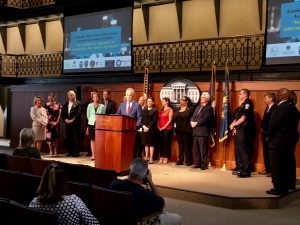 Mayor Greg Fischer joined partners from across public and private sectors today to announce the development of Kentucky’s first Law Enforcement Assisted Diversion program, known as LEAD, to divert opioid addicted people from jails in favor of case management and treatment.
Mayor Greg Fischer joined partners from across public and private sectors today to announce the development of Kentucky’s first Law Enforcement Assisted Diversion program, known as LEAD, to divert opioid addicted people from jails in favor of case management and treatment.
The LEAD program, which was first launched in Seattle in 2011, is an innovative pre-booking, community-based program focused on routing individuals suspected of committing low-level drug-related offenses away from jail and prosecution into treatment.
The Mayor announced the city has been awarded a $400,000 federal grant to fund a pilot project, serving 50 qualifying individuals who come into contact with police in the Portland and Russell neighborhoods over the next 18 months.
“The Opioid crisis remains a vital concern to public safety in this community,” said Mayor Fischer. “But incarceration cannot be the only option for those struggling with addiction. We must find ways to divert people to treatment and stem the tide of drug-related crime. This program is one more option for our community.”
For the past several months, the LEAD planning team has been putting together the framework for the pilot program, which is expected to be fully launched by Oct. 1.
Here’s how the program will work:
- LMPD officers working in the targeted beats in the Russell and Portland neighborhoods will use discretionary authority at the point of contact to divert eligible candidates into intervention for offenses driven by substance use disorder.
- The LMPD officer will determine eligibility for the LEAD program based on established offense criteria and criminal history exclusions. Eligible crimes will include felony possession of an opiate and possession of heroin under two grams, as well as low-level property crime stemming from opiate addiction.
- Instead of taking them to jail, officers will take those volunteering to participate to the Volunteers of America Mid-States triage location on West Broadway to be connected with a case manager.
- Within 72-hours a potential participant must complete an in-depth assessment before becoming one of the 50 pilot project participants to receive treatment and wrap-around services.
- Volunteers of America Mid-States will assume responsibility for the case management of the individuals.
- The Commonwealth Institute of Kentucky, housed at the University of Louisville School of Public Health and Information Sciences, will conduct the evaluation of the program.
“So often, officers come into contact with members of our community who are committing crime as part of their addiction to opioids and other drugs,” said Col. Michael Sullivan, deputy chief for Louisville Metro Police. “This gives officers a tool to divert people into treatment, rather than taking them to jail, where they may or may not get to address the underlying issue leading them to crime.”
Volunteers of America Mid-States will work with pilot program participants to coordinate services they need to get themselves back to a healthy and productive lifestyle.
“We know that we can change people’s lives when we surround them with professional care and treatment and access to comprehensive support and services,” said Jennifer Hancock, President and CEO of Volunteers of America Mid-States. “Opioid use and addiction is a public health crisis and LEAD will be successful because it offers a public health solution.”
University of Louisville’s School of Public Health and Information Sciences joins the partnership to help ensure the program is working as it should. Liza Creel, PhD, and Susan Buchino, PhD, both scholars of the Commonwealth Institute of Kentucky, will conduct the evaluation.
“Our evaluation will aim to measure outcomes in the areas of recidivism, public safety, cost savings, and fidelity to the Seattle LEAD model,” Creel said. “By following an evidence-based intervention that has shown success in other communities and designing it to meet Louisville’s needs, the Louisville LEAD pilot has great potential to positively impact participant lives and our community.”
Members of the planning team working to set up the pilot include:
- Jamie Allen, Louisville Metro Criminal Justice Commission
- Debora McGill, Project Coordinator, DFM Consulting
- Todd Felty, Louisville Metro Police Department
- Lisa Langford, Jefferson County Attorney’s Office
- Ebert Haegele, Office of the Commonwealth’s Attorney
- Sarah Moyer, Louisville Metro Public Health and Wellness
- Liza Creel, Commonwealth Institute, University of Louisville
- Susan Buchino, Commonwealth Institute, University of Louisville
- Mane Martirosyan, Louisville Metro Department of Corrections
- Margaret Pennington, REACH of Louisville
- Dan Goyette, Louisville-Jefferson County Public Defender Corporation
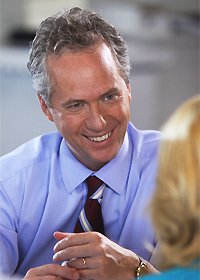 Mayor Greg Fischer announced today that The Big Table, a welcoming event aimed at bringing people together to share food and conversation, is returning to Iroquois Park on Sunday, Sept. 16 from 5-7 p.m. Last year, more than 1,300 people participated in the event, and organizers hope to boost that number this year.
Mayor Greg Fischer announced today that The Big Table, a welcoming event aimed at bringing people together to share food and conversation, is returning to Iroquois Park on Sunday, Sept. 16 from 5-7 p.m. Last year, more than 1,300 people participated in the event, and organizers hope to boost that number this year.
The annual event is hosted by The Big Table, with major support from the Global Human Project and the Louisville Metro Office for Globalization. Each participant is asked to bring a dish, fruit, dessert or non-alcoholic drink to share with at least six people. Participants are encouraged to bring a dish that reflects something about them, has a family story or personal significance, along with a recipe card. Tables, chairs, eating utensils and plates will be provided by event sponsors, but in case of an extra-large turnout, organizers encourage participants to bring a blanket and extra utensils.
Jud Hendrix, Executive Director of The Global Human Project and co-creator of the Big Table, said its purpose is to build greater community connections. “We hope the Big Table will spur a variety of other creative events to weave in the fabric of our community,” he said. “It’s simple. We’re inviting Louisville to be who we already are.”
In addition to encouraging conversation and meeting new people, organizers are hoping to break a world record. According to the Guinness Book of World Records, the largest potluck was attended by 3,264 people in India. In order for The Big Table event to be in the Guinness record book, participants must be present from 5:45 – 6:15 p.m., and each participant must bring a dish or refreshment to share.
Mayor Fischer encouraged people to attend.
“This event started last year to welcome immigrants to our community. They are important contributors – filling jobs, starting companies and sharing their culture and heritage. At a time when our nation and world are so often divided, the Big Table gives us the opportunity to come together and celebrate the connections we have as fellow human beings,” the Mayor said. “We are proud to be a city of welcome, inclusion and compassion, and I encourage all Louisvillians to join in this event and break a world record.”
A unique aspect of The Big Table is the intentionality around having conversations. “On the surface, it’s a simple potluck. The intention, however, is much deeper, hoping to create a space for Louisvillians of all beliefs and backgrounds to come together in order to connect, especially in a time when our society holds so many opposing points of view,” said Cathy Berkey, co-creator of the Big Table.
In an effort to foster more intimate conversation and depth of connection, participants will be organized into tables of eight. Table Host volunteers will help seat participants and work to ensure tables are made up of familiar and unfamiliar faces. Table Hosts will also facilitate conversation and storytelling during the event. Approximately 450 Table Host volunteers are needed for this event.
“There is no central stage or entertainment schedule; the magic of the event is in the conversations that happen at the tables,” said Berkey.
In case of inclement weather, organizers will announce a cancellation of the event by 1 p.m. on Sept. 16 on social media and the event registration page.
Registration is strongly encouraged. For more information and event registration, visit www.globalhumanproject.net/the-big-table2.html
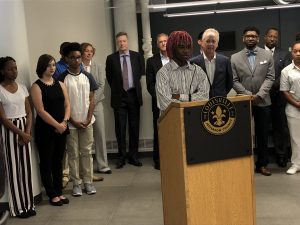 From computer coding to manufacturing and life-guarding to public finance, a record number of young people — 6,200 — gained new skills and confidence working at businesses and job sites throughout Louisville this summer as part of the SummerWorks program.
From computer coding to manufacturing and life-guarding to public finance, a record number of young people — 6,200 — gained new skills and confidence working at businesses and job sites throughout Louisville this summer as part of the SummerWorks program.
Mayor Fischer today congratulated youth and thanked the many private sector and non-profit employers who hired youth ages 16-21. That number includes 1,004 youth employed by companies and organizations that directly teamed with KentuckianaWorks and YouthBuild to provide more extensive career guidance and support.
Since its start in 2011, SummerWorks and its partner-employers have put more than 23,000 young people into summer jobs.
“SummerWorks is helping build critical skills with our young people, including many who might not otherwise have this opportunity to learn and grow in the right direction,” the Mayor said. “This effort not only helps ensure that Louisville is a city of opportunity for all our young people – it’s also helping build a pipeline of new talent which is crucial.”
At a season-closing event at the Humana Digital Experience Center, several young people shared their summer job experiences:
- Elanna Carr, 20, said her work in Public Finance at Hilliard Lyons was a “perfect real-life work fit and very beneficial,” even convincing her to major in Economics at the University of Louisville;
- Teandre Blincoe, 17, who worked in technology on the IT Service Desk at Humana, said the experience “meant a lot to me in building my customer skills and showing me possible career opportunities in the tech field.”
- Grace Hotkewicz, 17, who taught art to pre-school children at the Speed Art Museum. “I learned so much and it was a perfect fit for my career goal of creating digital animation for kids.”
Other SummerWorks’ youth worked in hospitals, restaurants, museums, banks and hotels. Working closely with supervisors and mentors, young people worked on manufacturing assembly lines and grocery check-out lanes, assisted companies with IT and human resources needs, worked in tourism and helped ship packages around the world.
Key employer-partner companies, including GE Appliances, Humana, Kentucky Kingdom, Kindred Healthcare and UPS, increased their direct hiring of SummerWorks youth from 2017. New employers included Dine Company, Hilliard Lyons, HJI Supply Chain Solutions, Kentuckiana Comfort Center, iQor, Louisville Bats, Spectrum and StoryWood Bowties.
More than 40 private-sector businesses participated this summer, and Mayor Fischer said a top goal for 2019 is to greatly increase the number of companies hiring youth.
Private donations sponsored 237 youth in jobs at dozens of non-profit organizations and public agencies, including Americana Community Center, Boys and Girls Clubs, Family Health Centers, the Food Literacy Project and Workwell Industries. TARC bus passes were provided to many youth to help get them to and from their jobs.
SummerWorks is playing a stronger role in shaping young talent through its partnership with the new Academies of Louisville initiative, which was rolled out at 14 JCPS high schools this year. The goal is for every student to have had a summer job experience by the time they graduate their Academy high school.
SummerWorks also helped build entrepreneurial skills by providing small grants to five organizations that engaged youth in summer projects ranging from bringing fresh produce to West Louisville, to providing digital skills to young women, to building a new bicycle pump track at Shawnee Park.
“We are thrilled to see this initiative grow and evolve in both the quantity of and quality of the job opportunities young people are able to experience,” said Michael Gritton, executive director of KentuckianaWorks, which operates SummerWorks in partnership with YouthBuild Louisville.
The Mayor launched SummerWorks right after taking office in 2011, in response to the elimination of federal funding for summer jobs. That first year, 200 young people were placed in jobs. The program was recognized by the U.S. Conference of Mayors in 2014 as one of the nation’s best summer jobs programs for young people.
The program’s core operating funds are approved by the Louisville Metro Council. Private donations sponsor jobs for youth in greatest need of the opportunity. Those contributors include the James Graham Brown Foundation, JPMorgan Chase Foundation, Diaz Family Foundation, Gheens Foundation, Mary Gwen Wheeler and David Jones, Jr. and other organizations and individuals.
The Mayor urged employers to make plans now to hire or support summer jobs for 2019. More information is at www.summerworks.org .
 Mayor Greg Fischer announced today that the city plans to move a statue of Confederate officer and President of the Board of Park Commissioners John Breckinridge Castleman from the Cherokee Triangle neighborhood and the George Dennison Prentice statue from outside the Louisville Free Public Library.
Mayor Greg Fischer announced today that the city plans to move a statue of Confederate officer and President of the Board of Park Commissioners John Breckinridge Castleman from the Cherokee Triangle neighborhood and the George Dennison Prentice statue from outside the Louisville Free Public Library.
The Mayor’s decision comes after a review of recommendations by a Public Art and Monuments Advisory Committee that he appointed late last year to develop a guiding set of principles for evaluating existing and future public art and monuments in the city. Beginning in January, the committee held seven public meetings, gathering hundreds of comments from residents throughout the city before submitting their recommendations to the Mayor on June 30.
The Mayor’s announcement comes days before the one-year anniversary of the horrific display of hatred and bigotry that occurred in Charlottesville, Va., over plans to remove a Confederate statue there. Mayor Fischer said the anniversary is a reminder of the necessity for all citizens to look at our monuments and statues through the eyes of those who have historically been discriminated against.
“Our Public Art and Monuments committee worked very hard, in cooperation with citizens, to develop thoughtful principles to help ensure that our public art and monuments respect our history but reflect the values of today,” he said. “I support those principles, and I used the criteria laid out in their report to make this decision about the Castleman and Prentice statues.
“We all agree with the report’s finding that our city must not maintain statues that serve as validating symbols for racist or bigoted ideology – that’s why we relocated the Confederate statue near the University of Louisville two years ago,” the Mayor said.
“While Castleman was honored for contributions to the community, it cannot be ignored that he also fought to continue the horrific and brutal slavery of men, women and children; heralded that part of his life in his autobiography; and had his coffin draped with both a U.S. and Confederate flag,” he said. “And while Prentice was founder and long-time editor of the Louisville Journal newspaper, he used that platform to advocate an anti-Catholic, anti-immigrant message that led to the 1855 Bloody Monday riot where 22 people were killed.”
The Mayor said he understands that some view Castleman’s life as a story of redemption, given his civic contributions after the Civil War. And others have argued the statue should remain, perhaps with a marker noting Castleman’s complex history.
“But to make no decision and leave the statue in place, or attempt to ‘balance’ it somehow, is to rationalize the suffering still caused to people whose ancestors were bought, sold and bred like animals on a farm. That is the cold reality of the Confederate cause,” the Mayor said. “My threshold question was whether this statue would be appropriate in a predominately African American neighborhood. The answer obviously is no. It would be viewed as disrespectful of a historic and painful past.
“Moving these statues does not erase history. Moving these statues allows us to examine our history in a new context that more accurately reflects the reality of the day, a time when the moral deprivation of slavery is clear.”
Mayor Fischer said appropriate relocations will be explored; the city is, for example, in conversation with Cave Hill Cemetery about moving the statues to their family burial grounds there. There are legal and financial issues to address with any relocation, including, for Castleman, a review by the Cherokee Triangle Preservation District. If no other suitable sites are found, the statues will go into storage.
The goal is to have any issues resolved and the statues moved by the end of the year.
The Mayor thanked Public Art Administrator Sarah Lindgren, the Commission on Public Art, and the Public Art and Monuments committee members, as well as the hundreds of people who participated in public meetings throughout the city over the past year.
“This was a challenging, emotionally charged subject. But as I said when this process began, we can only be a city where all citizens can reach their full human potential if we face our big challenges head-on, and this includes the challenges of race and equity,” the Mayor said. “This process shows that Louisville has developed enough social muscle to have a deep, productive, and sometimes uncomfortable community conversation about these challenges.”
The Mayor echoed the committee’s conclusion in a letter sent to him with the report: “We urge our community to continue the work of open dialogue, not only about public art and monuments, but about all symbols of racism and discrimination and how we as a community can move forward to advance equity, inclusivity and healing.”
The committee’s report can be found at Louisville Metro Public Art’s webpage: https://louisvilleky.gov/government/public-art
 Mayor Greg Fischer announced that Louisville Metro Government has been awarded a $10,550 AARP Community Challenge grant to begin making tactical improvements on Ninth Street, specifically at Muhammad Ali Boulevard.
Mayor Greg Fischer announced that Louisville Metro Government has been awarded a $10,550 AARP Community Challenge grant to begin making tactical improvements on Ninth Street, specifically at Muhammad Ali Boulevard.
The grant is part of the AARP Livable Communities Initiative, which supports the efforts of neighborhoods, towns, cities and rural areas to be livable and safe places for residents of all ages. The grant funds quick action projects that build momentum for change in communities to improve livability.
Announcement of the grant comes on the same day as a march for equity and justice designed to acknowledge the impact that racial segregation in the past has had on communities all over the nation. The march, which runs from downtown to Ninth Street, is planned as part of the Presbyterian Women’s triennial national gathering in Louisville.
Mayor Fischer, who is speaking at the march, welcomed the AARP grant.
“My administration is committed to breaking down the 9th Street divide by bringing more city and private sector investment than west Louisville has seen in decades,” he said. “This grant is a wonderful boost to our plan to make Ninth Street safer, more accessible and more attractive for residents on both sides of Ninth Street to travel and cross. I am very excited to receive this grant and get started on implementation.”
Louisville Metro Government will use the grant to improve the intersection of Ninth Street & Muhammad Ali Boulevard in three ways:
- Improving crosswalks—Crosswalks will be upgraded from current conditions to crosswalks with greater visibility. According to the Federal Highway Administration, these types of crosswalks can reduce vehicle-pedestrian collisions by nearly 50%.
- Adding street furniture—Plaza space and benches will be added to the median in front of an existing public art piece. The “Reimagine 9th Street” plan calls for places for residents to sit along Ninth Street.
- Enhancing Public Art—A plaque will be added to accompany the public art piece for telling its story and brining a historical perspective.
All grant funded projects will be completed by December 2018.
In addition to this grant, a “Reimagine 9th Street” plan, to permanently transform Ninth Street from River Road to Broadway, is underway. Mayor Fischer’s FY19 budget includes $180,000 for its formal design. For more information on “Reimagine 9th Street,” please visit https://louisvilleky.gov/government/advanced-planning/reimagine-9th-street
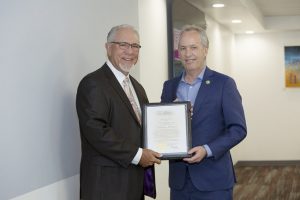
(PRNewsfoto/Glidewell Dental)
Glidewell Dental, a leading technological innovator in restorative dentistry for over 48 years, has announced the opening of the Glidewell International Technology Center, a new 8,500-square-foot training, education and demonstration center located in Louisville, Kentucky. This world-class center, which houses a cutting-edge, 40-seat classroom auditorium, provides contemporary, continuing education for dental professionals. It is the second companion center to its flagship West Coast facility located in Irvine, California.
With the aim of exploring the complexities of oral rehabilitation and its various treatment modalities, the center’s continuing education program encompasses all the principal methods of challenging, motivating and teaching like-minded clinicians. “The techniques and materials used in dentistry are ever-evolving and as healthcare professionals, it’s our responsibility to cultivate and be well-informed of those continuous improvements,” said Dr. Neil Park, vice president of clinical affairs at Glidewell Dental. “Our core mission at Glidewell has always been to advance the understanding of proven, fundamental methods for treating patients — and the increased demand for technology-focused education has sparked our expansion to the East Coast. Through this new Louisville-based center, dentists in the eastern half of the United States will be able to more conveniently access our quality continuing education programs without having to travel to Southern California.”
The center debuted with a special grand opening reception on July 12 attended by dentists, dental industry members and members of the local community, including Mayor of Louisville Greg Fischer. In a speech, Mayor Fischer recognized the Glidewell International Technology Center as integral to the Louisville community and surrounding areas. “Our city congratulates Glidewell Dental on expanding the reach of their valuable work through lifelong learning facilitated at the Glidewell technology center,” he said. “May the work carried out in this space bring forth brighter smiles shining across the world for years to come.”
The event also featured a speech from Jim Glidewell, CDT, founder and CEO of Glidewell Dental, who articulated the company’s vision for the center and garnered excitement for the upcoming curriculum. Hands-on courses and in-depth lectures will focus on all aspects of modern implant and restorative dentistry, including surgical dental implant placement, prosthetic rehabilitation, dental sleep medicine and more. A special acknowledgment was given to the first of the courses to take place at the center: “The Emergency Implant: Immediate Implant Placement in Extraction Sockets,” taught by Dr. Jack Hahn. A pioneer in the field of implant dentistry, Dr. Hahn, who was present at the reception, has been placing and restoring implants for 48 years. He joins many other hand-picked educators who have carefully crafted curriculum to help doctors become more confident and successful in their practice.
“Faculty and students are brought together by our shared passion for improving lives through oral health,” said Dr. Park. “We are inspired by this opportunity to share what we’ve learned over our nearly five-decade heritage, to bring more affordable, effective and innovative methods of treatment to doctors, to help rebuild smiles and enhance the quality of lives for patients in need. It is our hope that this Louisville education and training center helps doctors in their pursuit of finding practical answers to everyday clinical challenges.”
The Glidewell International Technology Center is located at 3841 Business Park Drive in Louisville, Kentucky. For more information or to register for upcoming courses, please visit glidewellcecenter.com or call 866-791-9539.
Angela Leet Releases Statement on Crime Numbers
Mayoral candidate and current District 7 Councilwoman Angela Leet called the Fischer Administration’s claim that crime is down, “dishonest.”
“This claim is absolutely disingenuous. During Fischer’s first year in office, there were 49 homicides in the county. Last year, there were 108 homicides in the county. This year, we are currently on track to double the number of homicides in Fischer’s first year. So seeing a tiny downtick in a few week’s time is not a victory when all Fischer has managed to do is set a new normal of more than a 100 homicides a year,” said Leet.
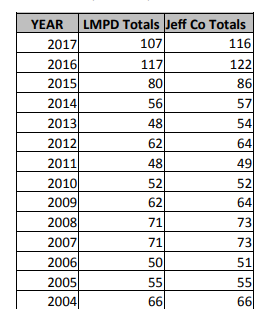 In a 2005 survey, Morgan Quitno Press ranked Louisville as the seventh safest large city in the United States with that rank dropping to number eight in the 2006 edition of the survey. Lousiville, however, failed to make independent security review site SafeWise’s 2017 list of 50 Safest Metro Cities in America at all and came in at 106 in WalletHub’s 2017’s Safest Cities in America rankings.
In a 2005 survey, Morgan Quitno Press ranked Louisville as the seventh safest large city in the United States with that rank dropping to number eight in the 2006 edition of the survey. Lousiville, however, failed to make independent security review site SafeWise’s 2017 list of 50 Safest Metro Cities in America at all and came in at 106 in WalletHub’s 2017’s Safest Cities in America rankings.
Leet claimed that the legacy of the Fischer Administration would be that “homicides have doubled, shootings have doubled, and drug overdose deaths have tripled” under the oversight of the current mayor.
The LMPD historical homicide data does show a dramatic uptick in murders over the past several years. The highest number of murders since 1960, the earliest year in which data is available, was 2016’s record setting year with 122 homicides in Jefferson County, followed closely by 2017’s number of 116 total homicides.
Fischer’s first year in office, 2011, saw the lowest number of homicides since 2003. The several years following his tenure as Mayor showed measurably higher numbers before beginning their remarkable increase to the numbers seen in recent years.
Leet continued, “For the 10 years prior to Fischer taking office, U of L Hospital admitted an average of 166 gunshot victims per year. During the Fischer Administration, U of L Hospital has seen an average of over 200 shooting victims, and that average is over 300 for the last 2 years. 1700 people have been admitted to University of Louisville Hospital for gunshot wounds since Fischer took office. That does not even include victims who were not admitted.”
Putting a rosy spin on crime numbers is nothing new, however. Last August we published the city’s release claiming that crime overall in Lousiville was down 4%, driven by large decreases in violent crimes such as rape and robbery, and smaller decreases in property crimes like larceny. The article, however, noted then that homicides were up by 20% over the previous year’s data.
However, Leet said of Fischer’s attempt “to spin a tale of ‘crime is down'” in a year in which he is up for reelection, “I am disappointed that Fischer is manipulating numbers and denying the reality of drug and gang issues in our neighborhoods.“
 Weather
Weather Traffic
Traffic @LouisvilleDispatch
@LouisvilleDispatch @LouisvilleDisp
@LouisvilleDisp Subscribe
Subscribe